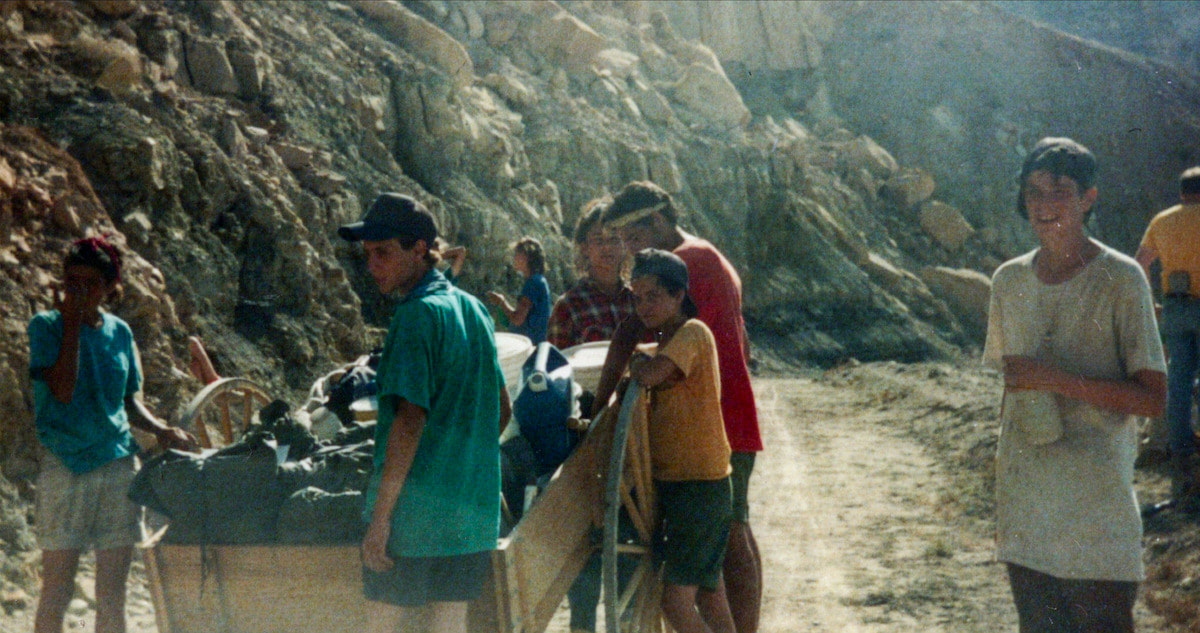|
TV-MA. One of the articles about this movie said that it was so bleak that it was considered an anti-Christmas movie. Yeah, it gets pretty rough, especially by the end. This is one of the movies that is aimed at shock. It does get pretty dark by the end, especially involving death and rape. Listen, it's not a competition. If you are watching to watch something dark, it gets there. Have you seen darker? Maybe, but that's not really the point of this section. It's dark and unsettling. TV-MA.
DIRECTOR: Liza Williams Out of all of the movies that I missed out on, I didn't think I'd be rushing over to watch Hell Camp: Teen Nightmare. I mean, there are so many great movies. Heck, we're in the predictive Oscar season. I know that Hell Camp: Teen Nightmare is probably not going to be on that list. Still, I decided to watch it. Do you know why? I feel like dumping some really intense dramas that you need to pay attention to on my wife right now wouldn't be fair. So we watched something that is short and true crime. That's the mood we were in and we basically got what we were looking for. I have some strong takeaways from Hell Camp that may not fill a whole blog. If I ramble and get long-winded, I'll be very impressed because I don't know where I'm going to go after I get my major claims out right now. This movie comes down hard on the wilderness survival therapy camp for troubled youths. No problem there. It's low hanging fruit. Spoiler alert: A kid dies and two people get sexually assaulted. The movie is an hour-and-a-half. About an hour-and-twenty minutes are anti-wilderness therapy camps, especially the ones created or run by Steve Cartisano. That's great. The weird part is the ten minutes of the movie that is not. About ten minutes of this movie are talking about how these therapy camps saved a lot of kids. Maybe not "a lot a lot", but more than you would think. I should be okay with that. After all, this is a documentary, although presenting a strong bias and agenda, that is shooting for objectivity. But I also wonder, "Why?" Part of me really wanted there to be a script of text claiming that many people were grateful for these camps and that they turned their lives around. I'm using myself as the audience for this next section by the way. As negative as these therapy camps come across in the course of the movie, I don't deny that I was somewhat influenced by the success stories that came from these camps. I've always been a bit of a wimp. I never really had my rebellious streak. I never would have needed one of these therapy camps. That being said, I also have five kids. What if some or all of them become turds? What if I was at the end of my rope and I needed something to get my kid back? I mean, I wouldn't do this. I know that. But I also can completely sympathize with the parents in this documentary. Like, I don't want to. And the movie does a good job to help me hate some parents. Like, I really hate the old guy who said that he should have sent his son to that camp for his entire life. I want to hate some of these parents. Williams does an admirable job of reminding me that I'm watching from a place of hindsight. Cartisano designed all of these advertisements to make it look like this was a safe endeavor. It looked professional and well-researched when none of that was really true. For all of that, I keep going back to that clip from Donahue. (That was Donahue, right?) Daytime talk shows tend to show some of the worst of humanity. I know. That's me being incredibly judgy. But I embrace my judginess. It's not very shocking that Boomers tend to be more conservative based on what we grew up with. There's this sequence on Donahue where Cartisano is confronted with some of the problems that come with wilderness therapy. But instantaneously, one of the ladies in the audiences talk about how today's youth don't listen and need this kind of discipline to adjust to the morality of the day. See, this is where I lose my mind. This is one of those docs that remind us of the dangers that Ronald Reagan brought into the home. There was this misconception that teens became evil in the '80s and '90s. Really, Boomers were some of the roughest teenagers in all of history. Think of the Rebel without a Cause kind of violence. There were straight up epidemics of teen violence and crime. Government agencies formed JD (Juvenile Delinquent) squads to crack down on teen crime. But apparently, everyone after this era was the real problems. We went from regular knife fights to kids having problems and everything is always on the younger generation.
0 Comments
Leave a Reply. |
Film is great. It can challenge us. It can entertain us. It can puzzle us. It can awaken us.
AuthorMr. H has watched an upsetting amount of movies. They bring him a level of joy that few things have achieved. Archives
July 2024
Categories |

 RSS Feed
RSS Feed